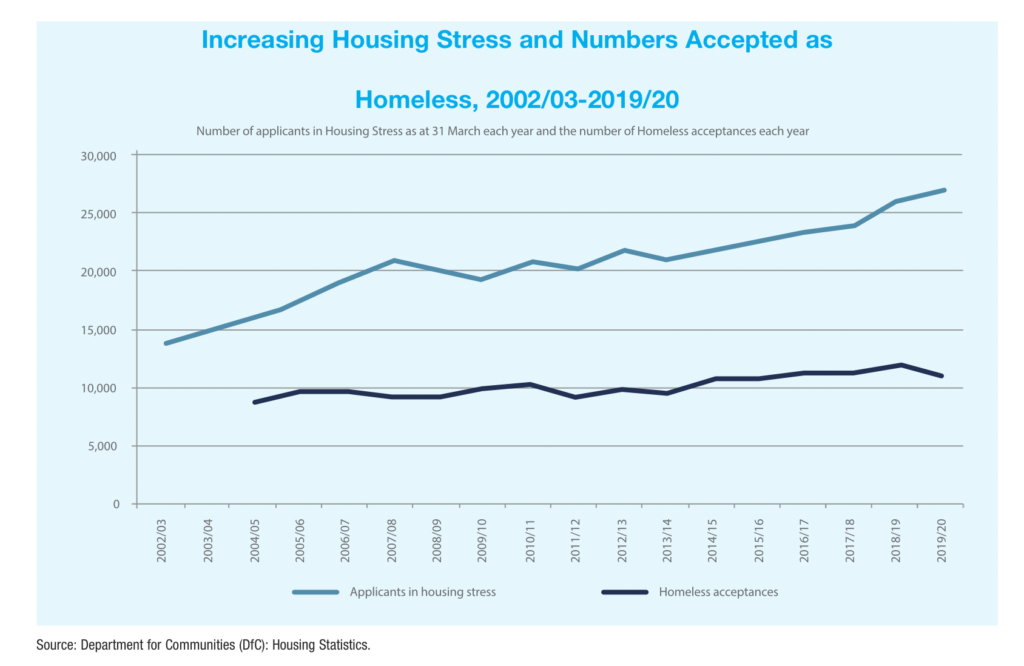
Simon is 50 but the charity finds little cause for celebration
27th May 2022
Time to talk about stigma
27th May 2022The Housing Supply Strategy

A 15-year plan to deliver over 100,000 homes, including over 33,000 social homes, and address supply-related pressures in Northern Ireland has been further delayed, with no new timeline for publication.
Initially disrupted due to Covid-19, the delivery of a long-term framework aimed at delivering transformative change to tackle rising levels of homelessness and those in housing stress in Northern Ireland was initially planned for publication in March 2022, but the Department for Communities has now said that the absence of a functioning Executive or agreed budget means “options are under consideration”.
With preparatory work having begun in 2019, a draft Housing Supply Strategy has concluded consultation and a final strategy is awaiting ministerial sign off. However, drafted on the assumption that the Northern Ireland Executive would publish a multi year budget, questions have been raised over whether the ambitions of the strategy will be properly funded, in the absence of an agreed budget.
The draft Housing Supply Strategy sets out a vision that “everybody has access to a good quality, affordable and sustainable home that is appropriate for their needs and is located within a thriving and inclusive community”, acknowledging that the adoption of a whole-system approach can ensure inclusive transformation of supply.
While looking out over a 15-year period to 2037, the Department for Communities has said that it plans for a series of enabling action plans over one- to three-year periods.
Rising levels of homelessness, coupled with a social housing waiting list in excess of 45,000, the vast majority of which are in housing stress, has been compounded by inflationary pressures on supply, rising rents and an acknowledgement that current housing stock is not reflective of the changing needs of the population.
Long-standing and underpinning themes in the current housing supply challenge include rising demand in response to population change and the growth in the number of households; a decline in home ownership linked to a significant increase in private renting and a widening gap between new housing demand and the annual rate of construction.
While Northern Ireland’s housing stock has increased over the past two decades to over 814,000 homes, an annual rate of growth of 6,200 homes is significantly lower than pre-financial crash levels of 11,500. Projections show a growing and ageing population, meaning levels of housing construction not only need increased but must meet changing demand.
The draft Housing Supply Strategy is centred on five key objectives:
1. Creating affordable options
While working to better understand existing stock and demand changes, the Department says it will increase in supply across all tenures and establish “new intermediate products” to provide alternative options outside of what is currently available. Long-term interventions include addressing infrastructure constraints, land availability and skills gaps, while also optimising public and private finance.
In the short term, the Department says it will ring-fence housing association grant funding to enable more social houses to be built, progress Housing Executive revitalisation, undertake an assessment of housing association powers and extend the scope of the current land registry for the public sector.
2. Prevention and intervention
On preventing homelessness, the Department acknowledges that delivery of new supply will go some way to addressing the demand of those most in need, however the draft strategy also outlines an ambition to progress a holistic approach to housing provision, recognising the importance of wraparound and support provision.
Alongside the ongoing work of the Housing Executive, the Department has indicated the desire to bring forward an interdepartmental Homelessness Action Plan and implement the 18 recommendations of the Review of the Common Selection Scheme, which looked at the current social housing allocations system.
3. Quality
Northern Ireland’s existing housing stock, particularly the private rented sector, face issues in relation to quality and it is acknowledged that the fitness standard in Northern Ireland is now lower than neighbouring jurisdictions.
While in itself a significant challenge, the need to decarbonise the housing stock offers an opportunity to ensure buildings are fit for the future. The Department has pledged to undertake a comprehensive review of fitness standards applicable for all tenures and suggests the potential creation of a new Homes Ombudsman with scope to assess improved building regulation standards and new home safety.
4. Better places
Local council led community plans and their local development plans, are set to guide the housing design and provision. The Strategy recognises the need not just to build new homes and to protect existing supply but also to build and maintain the inclusive and cohesive places in which homes are located, while also acknowledging “the wider social and economic impacts and consequences of the segregation of housing here… and the benefits of creating more shared housing areas”.
Continuation of progress and support of the Shared Housing programme is outlined by the Department, as is further research on new approaches to place-making.
5. Decarbonisation
Alongside a range of other measures linked in to cross-government, climate focuses strategies, the Department says it plans to work with social and intermediate housing providers to ensure new build homes are net zero carbon by 2026/27.
Challengingly, delivery of the strategy’s objectives is based on a number of assumptions that the Executive will act to address significant barriers including the current infrastructure investment gap, planning reform and providing necessary funding for decarbonisation.
Whether the strategy, when delivered, will be successful will rely heavily on not only solving the current political impasses but also ensuring that adequate funding is made available to address the range of challenges facing housing supply.
The Department says that the Housing Supply Strategy will be delivered through a series of detailed action plans, each of which will align with budget periods.







